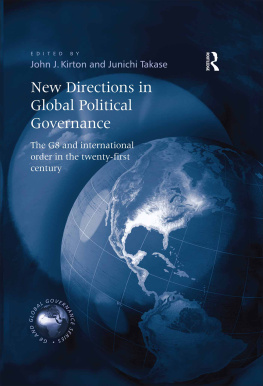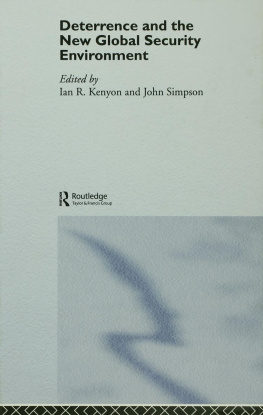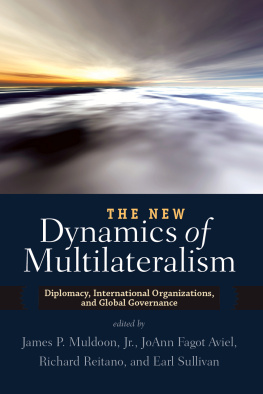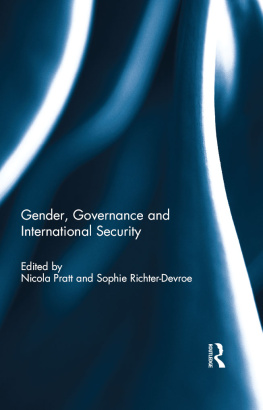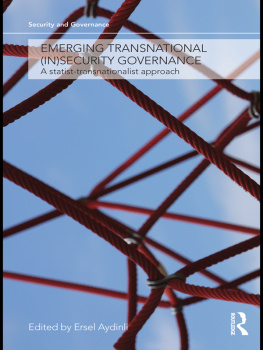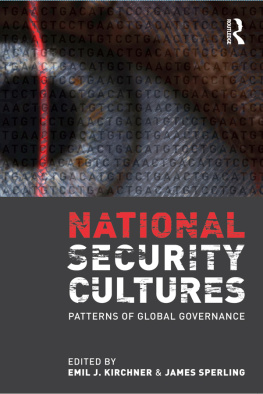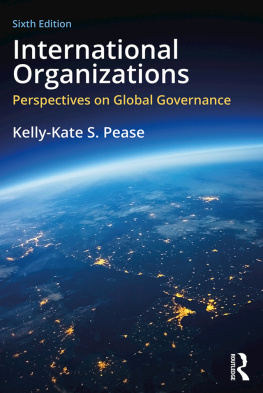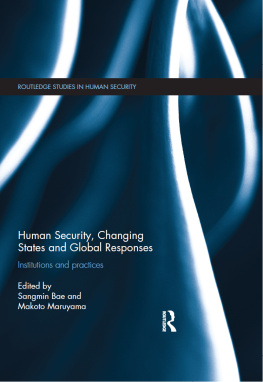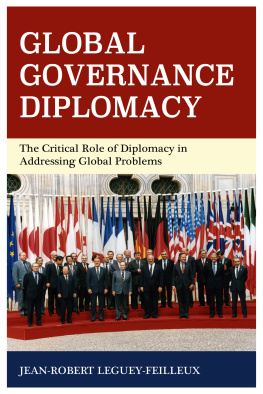NEW DIRECTIONS IN GLOBAL POLITICAL GOVERNANCE
The G8 and Global Governance Series
Series Editor: John J. Kirton
The G8 and Global Governance Series explores the issues, the institutions, and the strategies of the participants in the G8 network of global governance, and other actors, processes, and challenges that shape global order in the twenty-first century. Many aspects of globalisation, once considered domestic, are now moving into the international arena, generating a need for broader and deeper international co-operation and demanding new centres of leadership to revitalise, reform, reinforce, and even replace the galaxy of multilateral institutions created in 1945. In response, the G8, composed of the worlds major market democracies, including Russia and the European Union, is emerging as an effective source of global governance. The G8 and Global Governance Series focusses on the new issues at the centre of global governance, covering topics such as finance, investment, and trade, as well as transnational threats to human security and traditional and emerging political and security challenges. The series examines the often invisible network of G8, G7, and other institutions as they operate inside and outside established international systems to generate desired outcomes and create a new order. It analyses how individual G8 members and other international actors, including multinational firms, civil society organisations, and other international institutions, devise and implement strategies to achieve their preferred global order.
Also in the series
New Directions in Global Economic Governance
Edited by John J. Kirton and George M. von Furstenberg
ISBN0754616983
The New Transatlantic Agenda
Edited by Hall Gardner and Radoslava Stefanova
ISBN 0754617807
Guiding Global Order
Edited by John J. Kirton, Joseph P. Daniels and Andreas Freytag
ISBN 0754615022
Shaping a New International Financial System
Edited by Karl Kaiser, John J. Kirton and Joseph P. Daniels
ISBN 0754614123
Hanging In There
Nicholas Bayne
ISBN 075461185 X
The G7/G8 System
Peter I. Hajnal
ISBN 184014 776 8
The G8s Role in the New Millennium
Edited by Michael R. Hodges, John J. Kirton and Joseph P. Daniels
ISBN 1840147741
First published 2002 by Ashgate Publishing
Published 2016 by Routledge
2 Park Square, Milton Park, Abingdon, Oxon OX14 4RN
711 Third Avenue, New York, NY 10017, USA
Routledge is an imprint of the Taylor & Francis Group, an informa business
Copyright John J. Kirton and Junichi Takase 2002
The authors have asserted their moral right under the Copyright, Designs and Patents Act, 1988, to be identified as the authors of this work.
All rights reserved. No part of this book may be reprinted or reproduced or utilised in any form or by any electronic, mechanical, or other means, now known or hereafter invented, including photocopying and recording, or in any information storage or retrieval system, without permission in writing from the publishers.
Notice:
Product or corporate names may be trademarks or registered trademarks, and are used only for identification and explanation without intent to infringe.
British Library Cataloguing in Publication Data
New directions in global political governance : the G8 and
international order in the twenty-first century. - (The G8
and global governance series)
1. Group of Eight (Organization) 2. International
organization 3. World politics - 21 st century
I. Kirton, John J. II. Takase, Junichi
327.1
Library of Congress Control Number: 2002107 429
ISBN 13: 978-0-7546-1833-1 (hbk)
ISBN 13: 978-1-138-27779-3 (pbk)
To Robert Clarke Fauver One of United Statesfinest public servants
Robert Clarke Fauver joined the U.S. Department of the Treasury in 1970, where he served as International Economist, Director of the Office of Industrial Nations and Global Analysis, Staff Director of Yen-Dollar Negotiations of Financial Markets, and Staff Director of Financial Services Negotiations for the United States-Canada Free Trade Agreement.
In 1989, Fauver moved to the State Department as Deputy Assistant Secretary for East Asia and the Pacific, then U.S. Coordinator for Asian-Pacific Economic Cooperation (APEC), and finally Deputy Undersecretary of State for Economic Affairs.
From 1993 to 1994, he served at the White House as Special Assistant to the President and Senior Director for International and National Economic Affairs, National Security Council and National Economic Council, and as G7 Sherpa, the personal representative of the President to the annual summits.
In 1995, Fauver moved to the National Intelligence Council as National Intelligence Officer for Economics. Returning to the State Department in 1998, he served as India-Pakistan Coordinator and Senior Adviser to the Undersecretary for Economic Affairs. He retired from public service in 2000.
During his career, Fauver advised President Bill Clinton on international economic and financial policies, including annual G7 summits, financial market issues such as the Mexican crisis, Russian strategy, the International Monetary Fund, and the World Bank, and helped to create the first G7 jobs summit. As Staff Director for the U.S. Treasury, he designed the 1985 Plaza Accord, which co-ordinated the realignment of exchange rates among the G5 nations.
Fauver also negotiated the first APEC leaders meeting in Seattle in 1993, and crafted the leaders statement. As the first senior official appointed to the APEC process, he helped to solve the political problems associated with extending membership simultaneously to China, Taiwan, and Hong Kong.
Fauver also co-chaired the U.S.-Japan Structural Impediments Initiative, the first conceptual approach to trade and economic issues from a cross-sector, non-industry-specific perspective. He helped to design the first bilateral financial services agreement through the yen-dollar negotiations that led to the beginning of liberalisation and internationalisation of Tokyo financial markets. He also negotiated the financial services component of the U.S.-Canada Free Trade Agreement.
CONTENTS
John J. Kirton and Junichi Takase
Nicholas Bayne
Kaoru Ishikawa
John J. Kirton
Shinichiro Uda
Yuichi Morii
Takayoshi Egami
Junichi Takase
Mitsuru Kurosawa
Michael W. Donnelly
Steven L. Lamy
John J. Kirton
Peter l.Hajnal
Christine Lucyk and John J. Kirton
Gina Stephens
John J. Kirton and Junichi Takase
G8 Research Group
G8 Research Group
John J. Kirton and Ella Kokotsis
John J. Kirton, Ella Kokotsis, and Diana Juricevic
Miyazaki, 13 July 2000
Miyazaki, 13 July 2000
Okinawa, 21 July 2000
Okinawa, 21 July 2000
Okinawa, 23 July 2000

